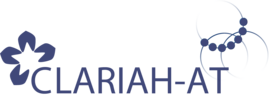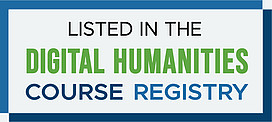Research
The humanities are becoming digital and the Centre for Information Modelling is supporting this process in the fields of:
1. Digital Asset Management
In light of the constantly growing number of digital resources, the humanities are increasingly confronted with the challenge of developing meaningful strategies and infrastructures which enable these resources to be fully realised and utilised to their full potential. The term “Digital Asset Management” has become synonymous with the various activities involved in the creation, storage, provision and archiving of digital content.
The Centre for Information Modelling at the University of Graz was founded in 2003 and began working on a comprehensive project based around the management of digital resources. The Humanities Asset Management System (GAMS) is used, evaluated and continuously developed within the framework of a large number of collaborative projects with both internal and external university partners, taking into account the specific requirements of humanities research.
This area of research is concerned with the technical infrastructure, the subject-specific curation of research datasets in the humanities – including their enrichment – and the representation of data in the Semantic Web and in other international research structures (e.g. DARIAH-EU, EOSC, Europeana etc.).
2. Digital editions, sources and text corpora
Together with experts from a wide range of disciplines, we work on questions around the digital representation and evaluation of text corpora and source materials in the humanities. The tasks go beyond the mere technical implementation of contemporary digital user interfaces and data management, and extend from theoretical foundations far into answering the methodological questions of the respective project domain or research area.
Based on standardised data models and annotation languages, along with complex data representation in ontologies in the Semantic Web or Web of Data, we work with our project partners in the sustainable and automation-supported semantic indexing of scientific content and develop new models and concepts in the areas of long-term archiving and digital knowledge management.
This area of research is not limited to “classical” text editions, i.e. the technically-adequate representation of texts and their indexing information, which in a large number of cases ranks between philological critical editions and historical source editions. Rather, we develop solutions for linguistic corpora, photography collections or text-mining procedures based on digital editions.
3. Digital Museology
This area of research investigates the effects of digital transformation on museums and their audiences, creating appropriate digital representations, whilst taking into account developments in the area of “Digital Asset Management” on an ongoing basis, and experimenting with digital methods in the study of museological and cultural heritage.
Digital museology investigates media forms of audience-related presentation and, in particular, how communication about cultural heritage takes place in digital mediums, e.g. in the context of social media tools and platforms. Through doing this, it contributes to research into the digital life of museum objects, digitally-born contemporary cultural heritage, as well as digital visitor research.
4. Digital History
The use of digital methods and digital sources for historical research is known under the collective term Digital History. At the University of Graz, this way of researching history has a long tradition and was conducted already early at the Institute of History as Historische Fachinformatik (HFI). Several researchers at ZIM also conduct research falling under Digital History.
They focus on the modelling and development of digital editions for historical research questions (keyword: assertive edition), on the creation of subject-specific ontologies and the integration of historical data into the Semantic Web or Web of Data (keyword: CIDOC CRM). The kind of historical data researchers at ZIM work with ranges from medieval charters and account books to 16th-century Imperial Diet records, 17th-century British tax records or prosopographical databases of translators from the mid-20th-century to places of remembrance of National Socialist persecutions. The research takes place in national and international interdisciplinary collaborations. The international dimension of research at ZIM is also reflected in the fact that staff members are active in international organisations such as the Digital Medievalist or the Data-for-History Consortium.
Within the framework of these four main research areas, we are particularly concerned with questions of modelling, X-technologies, text mining, front-end development with web technologies, and information architectures as methods for digitally supported interpretation and representation of research objects in all humanities. The provision of appropriate hardware by the University of Graz allows us to research digitisation with multispectral photography in cooperation with the Vestigia research centre. Finally, we are also investigating the use of digital media in academic practice, such as digital ethnographies.
Research activities in the area of digital diplomatics, Ethiopian manuscripts, medieval pragmatic literature and digital history are fed from specific disciplines in the humanities.







